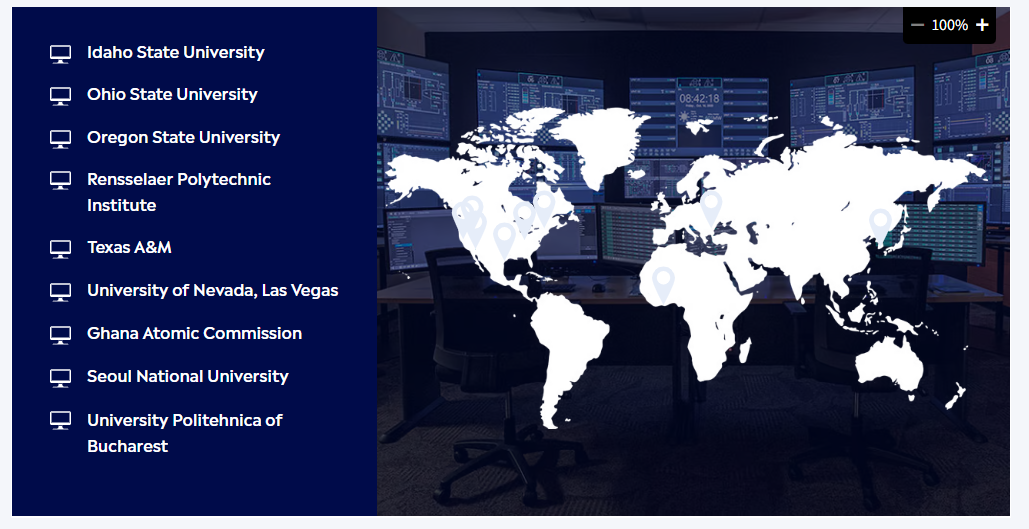Inside a Hands-On Nuclear Training Environment at UNLV
Map of global NuScale Energy Exploration Centers. Image: Courtesy of NuScale
NuScale’s Energy Exploration Center (or E2 Center) is an innovative learning environment that offers users a hands-on opportunity to apply nuclear science and engineering principles through simulated, real-world nuclear power plant operation scenarios. Using state-of-the art computer modeling, the simulator is intended to familiarize students with the operations of NuScale’s small modular reactor (SMR) nuclear control room, while providing generic fundamentals such as reactor theory, heat transfer, and fluid flow in a practical setting.
NuScale’s Energy Exploration Centers, like the one at the University of Nevada, Las Vegas (UNLV), are housed on campuses around the world with the primary mission of developing a strong pipeline of skilled graduates who are prepared for careers in the nuclear energy industry.
Several innovative features incorporated into the E2 Center simulator are unique to NuScale’s control room design. These features allow users to engage in hands-on learning about human factors engineering, human-system interface design, advanced diagnostics, control room automation, integrated nuclear plant operation, and more. Specific features include:
A library of digital procedures and automations
A tiered notification system that informs operators of abnormal conditions
Integrated emergency procedures
Fully automated sequences for changing output and controlling equipment
Access to E2 Center users group
Collaboration with over nine universities worldwide
The E2 Center housed at UNLV joins a growing global network of nine NuScale centers at leading universities across North America, Europe, Africa, and Asia, including Idaho State University, Ohio State University, Oregon State University, Rensselaer Polytechnic Institute, Texas A&M, University Politehnica of Bucharest, Ghana Atomic Commission, and Seoul National University. The key value factor for these universities is how the NuScale simulator can be incorporated into an existing nuclear or other engineering field degree program. In terms of UNLV’s utilization, this is the development of workshops that use the simulator to give students practical experience in nuclear energy control room operations.
When a university reaches out to NuScale to inquire about an E2 Center, the initial discussion with professors involves how the simulator can be used to optimize their coursework. The NuScale E2 Center is not only a product, but also a service, with training and support continuing over a service period.
The NuScale simulator can be installed anywhere with electrical power and internet connectivity. UNLV did not need to modify or change the existing classroom space except to move some furniture around.
The NuScale and UNLV partnership enables collaboration and feedback from a diverse group of professors, engineers, scientists, and students. As new training ideas and feedback are provided, NuScale evaluates and employs new methodologies for E2 Center upgrades. This ensures NuScale and UNLV will meet their joint goal of supporting the existing engineering curriculum with a state-of-the-art training tool.

